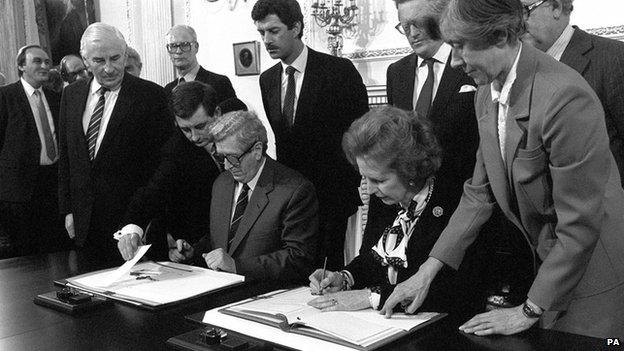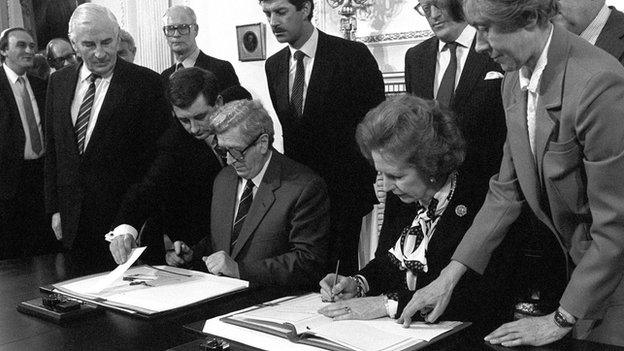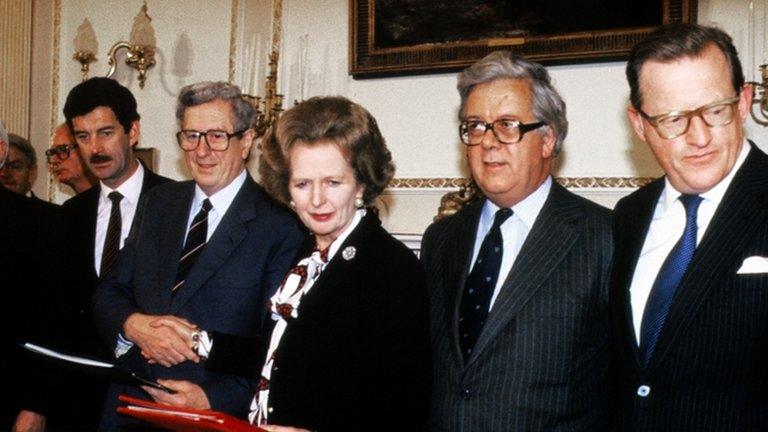Thatcher and FitzGerald talks: Redrawing of Northern Ireland border was discussed
- Published

Margaret Thatcher and Dr Garret FitzGerald signed the Anglo Irish Agreement which gave Ireland a say in the affairs of Northern Ireland on 15 November 1985 at Hillsborough Castle, County Down
Newly-released files from the Irish National Archives have revealed how the British and Irish Governments discussed redrawing the Northern Ireland border in 1984.
The then Prime Minister Margaret Thatcher talked about the idea with her Irish counterpart, Garret FitzGerald.
However, Mr FitzGerald rejected the offer
The exchanges are contained in files in Dublin's national archives released under the 30-year rule.
In exchanges at a crucial summit ahead of the Anglo-Irish Agreement, Mrs Thatcher argued that giving Dublin an official role in the running of the region would plunge it into civil war.
The files reveal that she told Mr FitzGerald in the November 1984 talks that resolving the crisis could mean "simply" moving the border.
"She wondered if a possible answer to the problem might not simply be a redrawing of boundaries," records an official note of the meeting.
However, Mr FitzGerald rejected the apparent offer.
"What we have achieved at present is a lowering of expectations," he said.
'Incomprehension'
The pair later discussed a federal, Belgium-style model.
Mr FitzGerald said the Irish government had worked on dampening hopes among some for an end to Northern Ireland as it was constituted.
The secret files include an official note of the two-hour Chequers summit, which show Mrs Thatcher's "incomprehension" as to what Irish nationalists wanted.
Mr FitzGerald explained that the minority felt Irish and part of the majority of the island of Ireland "from which they had been cut off by an arbitrary act".
He said the British had drawn a line around Northern Ireland, creating a Protestant majority, cutting off the minority from the rest of the island, and people were "set against each other within a narrow space".
He said Mrs Thatcher needed to deal with the alienation of northern nationalists.
He pressed her for a new system of governing Northern Ireland, based on agreed policies between the UK's secretary of state and an Irish government minister.
Mr FitzGerald said where they could not agree, decisions would be appealed to the Prime Minister and the Taoiseach.
However, Mrs Thatcher "reacted strongly" to the plan, according to the Irish government files.
"No, no - that is joint authority. You are giving them 40% of our country," she said.
Consequences
During exchanges, described by those at the meeting as rapid and vigorous, Mrs Thatcher fretted about the wider consequences of addressing Catholic alienation in relation to ethnic minorities in Britain.
She said: "If these things were done, the next question would be what comes next? Were the Sikhs in Southall to be allowed to fly their own flag?"
Mr FitzGerald said there had been agreement on an Irish government role in running Northern Ireland, adding that he could not ask the Republic of Ireland to give up its territorial claim over it without such a deal.
But Mrs Thatcher said: "It smacks too much of joint authority. That was definitely out."
"The unionists would say you are giving up your constitutional claims but you are coming across the border and don't really need the claim. That would put us well on the way to civil war," she added.
Discussing a suggestion from Mr FitzGerald of a Belgium-style solution - a federal arrangement under a monarchy - Mrs Thatcher said she "had not ruled it out, even though it would be attacked by unionists as an effective repartition".
She added: "History shows that the Irish, whether the Scottish-Irish or the Irish-Irish, don't like to move. However, they all seem to be terribly happy to move to Britain."
Mrs Thatcher also complained there was too much public-sector employment in Northern Ireland, there was no wealth creation and that it was costing London £2bn a year in subventions at the time.
She was also worried about a threat of more violence as a result of the Anglo-Irish talks.
"There was a real danger that a Marxist society could develop," she added.
- Published29 August 2014

- Published29 August 2014
